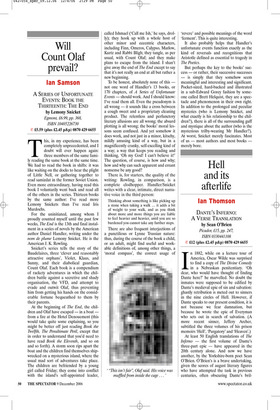Will Count Olaf prevail?
Ian Samson
A SERIES OF UNFORTUNATE EVENTS: BOOK THE THIRTEENTH: THE END by Lemony Snicket Egmont, £6.99, pp. 368, ISBN 10405226730 ✆ £5.59 (plus £2.45 p&p) 0870 429 6655 This, in my experience, has been completely unprecedented, and I doubt will ever happen again: three members of the same family reading the same book at the same time. We had to read the book in shifts: it was like waiting on the docks to hear the plight of Little Nell, or gathering together to read samizdat in the former Soviet Union. Even more extraordinary, having read this book I voluntarily went back and read all of the others in the series. Thirteen books by the same author: I’ve read more Lemony Snickets than I’ve read Iris Murdochs.
For the uninitiated, among whom I proudly counted myself until the past few weeks, The End is the 13th and final instalment in a series of novels by the American author Daniel Handler, writing under the nom de plume Lemony Snicket. He is the American J. K. Rowling.
Snicket’s series tells the story of the Baudelaires, three ‘clever and reasonably attractive orphans’, Violet, Klaus, and Sunny, and their diabolical guardian, Count Olaf. Each book is a compendium of rackety adventures in which the children battle against a secretive and shady organisation, the VFD, and attempt to evade and outwit Olaf, thus preventing him from getting his hands on the considerable fortune bequeathed to them by their parents.
At the beginning of The End, the children and Olaf have escaped — in a boat from a fire at the Hotel Denouement (this would take quite some explaining, so you might be better off just reading Book the Twelfth, The Penultimate Peril, except that in order to understand that you’d need to have read Book the Eleventh, and so on and so forth). A storm soon rips apart the boat and the children find themselves shipwrecked on a mysterious island, where the usual mad sort of adventures take place. The children are befriended by a young girl called Friday; they come into conflict with the island’s self-appointed leader, called Ishmael (‘Call me Ish,’ he says, drolly); they hook up with a whole host of other minor and eccentric characters, including Finn, Omeros, Calypso, Marlow, Kurtz and Rabbi Bligh; they tangle, as per usual, with Count Olaf; and they make plans to escape from the island. I shan’t give away the end of The End except to say that it’s not really an end at all but rather a new beginning.
To be honest, absolutely none of this not one word of Handler’s 13 books, or 170 chapters, of A Series of Unfortunate Events — should work. And I should know: I’ve read them all. Even the pseudonym is all wrong — it sounds like a cross between a cough sweet and a proprietary cleaning product. The relentless and perfunctory literary allusions are all wrong; the absurd plotting is all wrong; the books’ moral lessons seem confused. And yet somehow it does work, and not just in a minor, kitschy, mildly amusing kind of a way, but in a magnificently cranky, self-excelling kind of a way; a way that keeps you reading and thinking, ‘Oh my God! I can’t believe it!’ The question, of course, is how and why; how and why can such apparent and errant nonsense be any good?
There is, for starters, the quality of the writing: Rowling, in comparison, is a complete clodhopper. Handler/Snicket writes with a clear, intimate, direct narrative voice in the third person:
Thinking about something is like picking up a stone when taking a walk ... it adds a bit of weight to your walk, and as you think about more and more things you are liable to feel heavier and heavier, until you are so burdened you cannot take any further steps.
There are also frequent interjections of a punctilious or Lynne Trussian nature: thus, during the course of the book a child, or an adult, might find useful and workable definitions of, among other things, a ‘moral compass’, the correct usage of ‘revere’ and possible meanings of the word ‘ferment’. This is quite interesting.
It also probably helps that Handler’s unfortunate events function exactly as the kind of reversals and recognitions that Aristotle defined as essential to tragedy in The Poetics.
But perhaps the key to the books’ success — or rather, their successive successes — is simply that they somehow seem meaningful and interesting and significant. Pocket-sized, hard-backed and illustrated in a sub-Edward Gorey fashion by someone called Brett Helquist, they are a spectacle and phenomenon in their own right. In addition to the prolonged and peculiar mysteries (who is Lemony Snicket, and what exactly is his relationship to the children?), there is all of the surrounding guff and mystique about the author (who is the mysterious trilby-wearing Mr Handler?). At worst, Snicket merely fascinates. Most of us — most authors and most books merely bore.


























































































 Previous page
Previous page